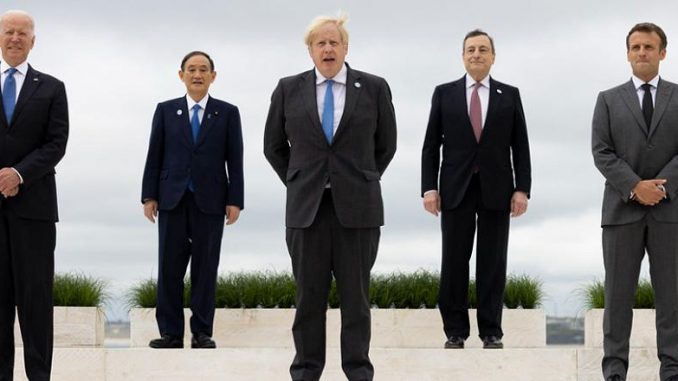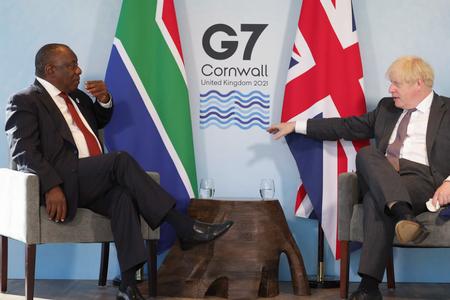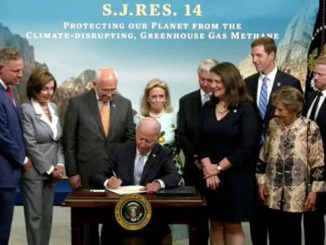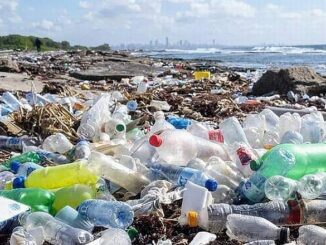
FALMOUTH, Cornwall, UK, June 13, 2021 (ENS) – The leaders of the world’s seven wealthiest democracies, the Group of Seven, G7, underlined their shared democratic values in today’s agreement to “beat COVID-19 and build back better.”
At the end of their three days together, in person without masks, in Carbis Bay, Cornwall at the tip of southwest England, the leaders of Canada, France, Germany, Italy, Japan, the United Kingdom and the United States set their global agenda, “united by “our enduring ideals as free open societies and democracies, and by our commitment to multilateralism.”
The UK holds the presidency for the G7 Leaders’ Summit 2021 and invited India, along with Australia, South Korea and South Africa, as guest countries. The European Union participates in all G7 discussions as a guest, represented jointly by the President of the European Council and the President of the European Commission.
Topping their agenda is putting an end to the ravages of COVID-19. They plan to:
● End the pandemic and prepare for the future by driving an intensified international effort, starting immediately, to vaccinate the world by getting as many safe vaccines to as many people as possible as fast as possible.
The G7 leaders said they’re on “a mission to shorten the cycle for the development of safe and effective vaccines, treatments and tests from 300 to 100 days.”
Total G7 commitments since the start of the pandemic provide for a total of over two billion doses of various vaccines, with the commitments since they last met in February providing for one billion doses over the coming year.
The G7 nations plan to strengthen their collective defenses against threats to global health by increasing and coordinating global vaccine manufacturing capacity on all continents, improving early warning systems, and supporting science.
Next on the G7 agenda is to:

● Reinvigorate our economies by advancing recovery plans that build on the $12 trillion of support we have put in place during the pandemic. These government leaders say they will continue to support their economies “for as long as necessary, shifting the focus of our support from crisis response to promoting growth into the future, with plans that create jobs, invest in infrastructure, drive innovation, support people, and level up so that no place or person, irrespective of age, ethnicity or gender is left behind.”
“This has not been the case with past global crises, and we are determined that this time it will be different,” the G7 leaders asserted.
● Next on the list is a landmark agreement to set a global minimum corporate tax rate of 15 percent. U.S. Treasury Secretary Janet Yellen has said that a global tax, which would apply to companies’ overseas profits, would eliminate what she calls a “global race to the bottom” concerning nonpayment of corporate taxes.
The G7 leaders said, “We will collaborate to ensure future frontiers of the global economy and society, from cyber space to outer space, increase the prosperity and wellbeing of all people while upholding our values as open societies. We are convinced of the potential of technological transformation for the common good in accordance with our shared values.”
Environmental protection, often absent from past G7 agendas, was not forgotten by the 2021 G7 leaders. They would:
● Protect our planet by supporting a green revolution that creates jobs, cuts emissions and seeks to limit the rise in global temperatures to 1.5 degrees.
Mindful of the Paris Agreement on climate, which aims to hold global warming to 1.5 degrees Celsius above pre-industrial temperatures, the G7 leaders committed to these greenhouse gas emissions goals – net zero no later than 2050, halving G7 collective emissions by 2030, increasing and improving climate finance to 2025; and conserving or protecting at least 30 percent of our land and oceans by 2030.
“We acknowledge our duty to safeguard the planet for future generations,” they affirmed.
Next on the G7 to-do list is to:
● Strengthen our partnerships with others around the world, including “a new deal with Africa.” We will develop a new partnership to “build back better” for the world, “through a step change in our approach to investment for infrastructure, including through an initiative for clean and green growth.”
In an idealistic statement, the G7 leaders pledged, “We will harness the power of democracy, freedom, equality, the rule of law and respect for human rights to answer the biggest questions and overcome the greatest challenges.”
“We will do this in a way that values the individual and promotes equality, especially gender equality, including by supporting a target to get 40 million more girls into education and with at least US$2.75 billion for the Global Partnership for Education.”
Now that they agree on this way forward, the G7 leaders are looking towards coordinating with the G20 nations that are not already in the G7: Argentina, Australia, Brazil, China, India, Indonesia, Italy, Republic of Korea, Mexico, Russia, Saudi Arabia, South Africa, Turkey.
“We shall seek to advance this open agenda in collaboration with other countries and within the multilateral rules-based system,” the G7 leaders said in their final statement. “In particular,” they said, “we look forward to working alongside our G20 partners and with all relevant International Organisations to secure a cleaner, greener, freer, fairer and safer future for our people and planet.”
Featured image: G7 Leaders Summit host UK Prime Minister Boris Johnson (front row, center) poses for a family photograph with: (from left front row) U.S. President Joe Biden and France’s President Emmanuel Macron, (from left back row) European Council President Charles Michel, Japan’s Prime Minister Yoshihide Suga, Italy’s Prime Minister Mario Draghi, and European Commission President Ursula von der Leyen during the G7 Leaders summit in Carbis Bay. June 11, 2021 (Photo by Simon Dawson courtesy No 10 Downing Street)
© 2021, Environment News Service. All rights reserved. Content may be quoted only with proper attribution and a direct link to the original article. Full reproduction is prohibited.



